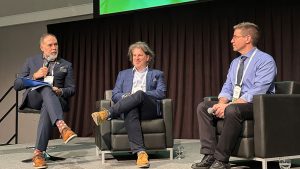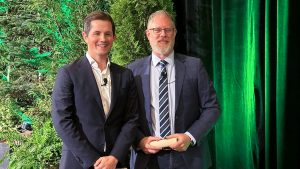New direction means graduates can deal with both short-term and looming issues problems, from labour shortages to global warming.
B.C.’s academic institutions are rethinking programs for today’s generation of engineers and geoscientists by placing a greater focus on a broader view of education. The new direction attempts to provide graduates with the ability to deal with both short-term issues such as B.C.’s booming economy and looming issues like growing populations, natural disasters, increased technology in daily life, and global warming. Specialization isn’t forgotten, but it is being downplayed in favour of an educational slant instilling students with a sense of discovery, self-initiation, inter-personal skills and leadership.
UBC’s Integrated Engineering (IGEN) program, initiated in 2000, offers students a holistic approach to engineering studies. “They take courses in every department (civil, mechanical, chemical, materials, electrical and mining),” says Dr. Scott Dunbar, in charge of the program. Students are offered six technical electives, which provide the opportunity for some specialization.
Dunbar says this approach to learning is a response to increased demands on engineers. “Society expects more to be available to it, such as more and better transportation systems, better equipment, or more applications. At the same time we are facing issues such as environmental degradation and climate change and demanding something be done. Such demands can be conflicting with present design paradigms and either some compromise must be made or innovative thinking is necessary to change the paradigm. An engineer with a broad perspective is better equipped to do either,” he says.
There also exists a barrage of more stringent and complex technical, health, and safety regulation as well as provincial and federal legislation regulating engineering activity. Therefore, it becomes harder to simply teach what is needed as opposed to teaching how to seek out what’s required. In addition, “Engineering is becoming a commodity,” says Dunbar, as companies draw engineering services internationally and as some types of engineering become “cookbook” technical skills. “Therefore we engineers need to distinguish ourselves in some way,” he says, adding that breadth is one strong defense against commoditization.
Dunbar says IGEN students take design project courses beginning in second year, “We think these courses are important. Engineering students have to get out of the science mode they learned in high school and into design mode because that is what engineers do,” he says. In the second year student teams are provided projects with specific design constraints and materials. In third and fourth year, student teams initiate, develop (including fabricate) and manage projects of their choice with guidance from professors. The teamwork helps develop interpersonal skills as well as leadership. “Technical skills are important, but in the real world you are working with people,” he says.
Each project requires weekly reporting, written interim and final reports, and oral presentations. This process enhances the communication skills of new engineers – a facet that employers have often found lacking in engineers. Third and fourth year IGEN students give impressive presentations that surpass those of other students. “The presentation skills of our students have made a distinct impression both on and off campus,
Consultants and companies that deal with the public seem to like our graduates since those communication skills become very useful when presenting ideas to clients, the public and government bodies,” says Dunbar, As well, the interdisciplinary aspect of their education provides smooth communications with all kinds of engineers and other professionals. They are also favourites with smaller consulting firms who want a diverse background in an employee.
The program only takes 30 students a year, but Dunbar has noticed one interesting trend. Some student teams have designed products they hope to take to market. “Students with an entrepreneurial flare seem to be attracted to the program or perhaps they get the flare while in the program,” he says.
At the British Columbia Institute of Technology, change is also occurring as the institute known for providing two-year, “hands-on” programs for engineering technologists is expanding its bachelor of engineering program. The four-year program isn’t a “two-and-two” program, adding two more years to the technologist program, says Trevor Williams, dean of the school of manufacturing, electronics and industrial processes. Rather, it is four years of independent study. Civil engineering, which has 20 students, graduates its first class this year and is currently under review by the Canadian Engineering Accreditation Board. Mechanical and electrical programs are being added. The mechanical program is currently taking students for the program to begin in September 2007. “The other program is electrical and this one is scheduled in September 2007 as well,” says Williams.
“Our focus through our programs is to prepare a graduate to be an engineering practitioner,” says Williams. BCIT graduating engineers will have “a lot more of hands-on experience” with equipment, problem-solving or trouble-shooting than in conventional engineering programs. “These graduates will gain job-ready skills which enable them to assume responsibility quickly.”
While the programs are independent, the students do share some common courses during the first two years and then specialize, but within the specialization there are common courses. “One has to be careful in engineering education that there is not too narrow a focus on the nitty-gritty of engineering, so that students have no skills to meet the future,” he says.
“They are really learning to learn. The great challenge is individual lateral thinking and being capable of taking something from one area and move it to another.”
Williams believes BCIT provides a needed marketplace perspective. “There is a need for a specialist but there is also a need for generalist and most students graduating from our bachelor of engineering programs are generalist.”










Recent Comments
comments for this post are closed